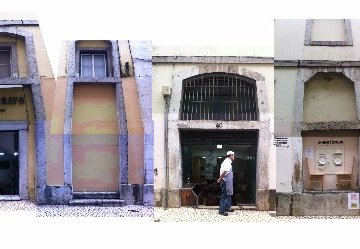- About
- Topics
- Picks
- Audio
- Story
- In-Depth
- Opinion
- News
- Donate
- Signup for our newsletterOur Editors' Best Picks.Send
Read, Debate: Engage.
In the historic neighbourhood of Alfama in Lisbon, the hustle and bustle of tourists and the screech of suitcases is unavoidable. The steep and winding narrow streets, the many staircases, as well as the antiquated and sometimes crumbling buildings do not put off the thousands of tourists who descend on Lisbon each summer. After all, the Portuguese capital is one of today’s trendiest holiday destinations: it has just been chosen for the second consecutive year as the best tourist city in the World Travel Awards.
In the heart of Lisbon, Alfama, the home of fado music, is one of the most attractive for foreigners. But after the tourist boom that the city has experienced in recent years and as permanent housing has been transformed into short rental accommodation, the authenticity of the neighbourhood is on the verge of extinction. The powerful forces of gentrification are pricing out local residents who are being largely replaced by foreign visitors.
Although tourism is contributing to the economic recovery of the country and fostering the urban rehabilitation of a city with many abandoned buildings, the new cosmopolitan Lisbon is also leaving many people behind. For many of those who managed to weather the financial collapse of 2008, the real crisis hit later. As long-term rental apartments are scarce and rents have skyrocketed, thousands of people have been evicted from their homes, a phenomenon which greatly impacts older residents.
But the tourist boom is not the only factor responsible for the unsustainable situation. The perfect storm that hit Lisbon has gathered pace due to the explosion of the housing market. In just five years, house prices rose by an average of 35 percent, and in the historical neighbourhoods of the Portuguese capital, the figures doubled. Such stark rises have been exacerbated by strong demand from foreign citizens who, on average, pay 40 percent more for a house than a Portuguese national.
In recent years, thousands of pensioners from other European countries have decided to retire in Portugal, attracted by good weather, good food and hospitality. But mainly attracted by the tax exemption it offers to pensioners from other countries. In that light, the Portuguese government has been criticised for giving out 5,700 Golden Visas since 2012, rewarding those who buy a property worth over 500,000 Euros. In addition to clearly fuelling real estate speculation, the scheme has been embroiled in controversy because of its lack of transparency and suspicions of money laundering and corruption.
Raising awareness and highlighting the exodus of residents that have lived in Alfama for generations, a photographer’s initiative sees portraits of residents plastered on the walls of their former homes. Unless urgent action is taken, the only way to experience the authenticity of Lisbon's historic neighbourhoods will be to look at photographs and reminisce over the past.
Photo by aestheticsofprotest
